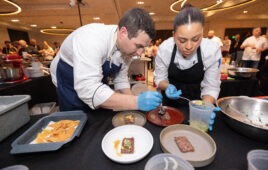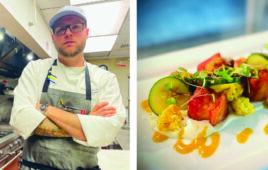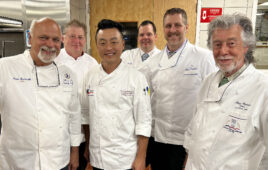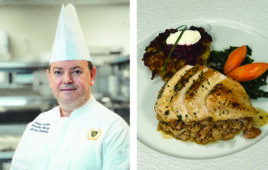
J. Kevin Walker, CMC (left), announced his plan to retire at the end of the year. Executive Sous Chef Shannon Farmer (right) will take his place as Ansley Golf Club’s Executive Chef.
When he joined Ansley Golf Club as Executive Chef in 2018, J. Kevin Walker, CMC, knew he wanted to build a legacy.
“There’s no better way to do that than to have someone you’ve personally trained take over for you,” he says.
After nearly 40 years in the culinary industry, Walker announced his plan to retire at the end of the year. His Executive Sous Chef, Shannon Farmer, who’s been an integral part of the Atlanta-based club for a decade, will take his place as Executive Chef.
Walker has had an immeasurable impact on the club, but his choice to spend more time with family presents an important opportunity for Farmer, who has developed a strong relationship with members and staff over the past 10 years.
“I knew this was the position I was ready for,” she says. “But I didn’t think it’d be at Ansley. I love this membership and crew; they have always been great to me. It’s unlike any other club.”
A Cook at Heart
For Walker, retirement means time to rest and be with family. He and his wife, Betsy, will move closer to her parents.
“My wife has always supported me in this profession,” he says. “She’s been there at every turn. And now I want to be there for her.”
It’s nearly impossible to overstate Walker’s success and distill his accomplishments over decades of hard-earned experience. He’s competed in dozens of culinary competitions since 1993 and has won several gold medals and numerous national culinary awards.
Walker was named National Chef of the Year in 2007 as well as the American Culinary Federation (ACF) Greater Atlanta Chapter’s Chef of the Year. In 2008, he was inducted into the American Academy of Chefs (AAC). He received the ACF Presidential Award in 2009 and was awarded the AAC’s Chef Good Taste Award in 2011.
He’s an accomplished coach and manager, too. He coached Daniel Gorman at the Chaîne des Rôtisseurs Young Chefs Competition in Turkey and was named manager of ACF Culinary Youth Team USA in 2016. Walker is also an ACF-approved competition judge, was a founding member of the ACF Professional Chefs Association of Houston and is currently one of the coordinators for the annual Chef to Chef Conference.
Although he’s been in restaurants since he was 14, washing dishes, Walker considers working at the Arizona Biltmore in Phoenix when he was 20 years old to be his first professional role.
 “What I learned at the Biltmore has applied to my entire career,” he says.
“What I learned at the Biltmore has applied to my entire career,” he says.
Later, he attended The Culinary Institute of America (CIA) in Hyde Park, N.Y., where he graduated Summa Cum Laude. This is where he met Fritz Gitschner, CMC, who was the Executive Chef of Houston (Texas) Country Club at the time and became one of Walker’s most significant mentors.
Walker would go on to spend three years at Houston CC as Executive Sous Chef, followed by a year as restaurant chef of Four Seasons Resort and Club Dallas at Las Colinas. He was offered his first Executive Chef position at The Lafayette Club in Minnetonka Beach, Minn., where he spent the next four years.
In 2000, he moved to Greenville (S.C.) Country Club. And in 2002, he achieved his Certified Master Chef (CMC) designation through the ACF—a 12-year journey, he says, inspired by the CMCs he met at the CIA.
“That was my whole reason for taking the test, to see how I stood up against them,” Walker says. “I learned quickly that it wasn’t about standing up to them. It was about learning for myself—and that passing the exam doesn’t mean as much as what you do after.”
Walker was offered the Executive Chef position at Cherokee Town and Country Club in Atlanta, where he spent the next nine years helping the club build an exceptional culinary program. He was at Cherokee when he first met and hired Farmer.
Walker then moved to The Vintage Club in Indian Wells, Calif., before deciding to “try something different” by taking a Director of Clubhouse Operations position at Grandfather Golf and Country Club in Linville, N.C. There he helped to implement a “kitchen-out” approach instead of a “dining room-in” approach. For Grandfather G&CC, this meant going back to basics: simplifying operations, using correct
methods—and educating staff and members on what it takes to put out a good product.
While at Grandfather G&CC, Walker got a call from Ansley’s GM at the time, who wanted recommendations for the club’s next Executive Chef.
“I went home and told my wife,” says Walker. “She said, ‘You told him you, right?’ We’d always talked about getting back to Atlanta. But I told her that I wasn’t in the kitchen anymore. She said, ‘In the four years you’ve been [Director of Culinary], you’ve never come home excited—not like you do when you’re in the kitchen.’”
He joined Ansley as its Executive Chef in 2018.
“I’m a cook at heart,” he says. “Cooks are just built differently.”
Ansley’s Community
Ansley, open since 1912, is a family-oriented club with 1,600 members across two locations.
“Our Midtown location is the heart and soul of the club from a social standpoint,” says Calvin Bolling, Ansley’s General Manager. “It’s in the middle of a vibrant community. About 80% of our members live within a 10-mile radius.”
Settindown Creek, Ansley’s secondary location, was acquired in 1999 and is located in Roswell, Ga., about 30 minutes north of Midtown Atlanta. It has an 18-hole rural course.
Across the two locations, Ansley offers members a Jr. Olympic-size swimming facility, eight tennis courts, two pickleball courts, a fitness center, youth programs, 27 holes of golf, eight dining rooms and bars, six banquet rooms and four kitchens. Its food-and-beverage operation averages $5.3 million annually.

Ansley Golf Club is a family-oriented club in Midtown Atlanta with 1,600 members across two locations.
At the start of 2020, Ansley completed a $3 million renovation, which included a kitchen remodel to replace critical equipment and flooring. The club also expanded the kitchen’s footprint, particularly in the cooler and dish station, while adding room for pastry and a chef’s table. Walker, who’d completed five other kitchen renovations at prior clubs, was instrumental throughout the process.
When COVID hit around that same time, Ansley and its membership were incredibly supportive, Walker says, offering continued pay for staff during multiple shutdowns.
Since 2020, as with many clubs, food costs have increased significantly. At the start of 2022, Ansley opted to raise menu prices by about 10%.
Clubs must be aware of what restaurants are doing and give members better quality at a better price, Walker says, while challenging and educating the membership on what it takes to run a quality operation—and the costs involved. Each month, Ansley’s culinary team provides the board of directors with a breakdown of the top 20 items it uses, comparing the price a year ago to today.
 “I’ve sat in house committee meetings and said, ‘I can either put the burger on the menu at $17, or I can run it at $13, and we’re going to run a higher food cost,’” Walker says. “‘But I’m not going to change the quality of the food we serve.’”
“I’ve sat in house committee meetings and said, ‘I can either put the burger on the menu at $17, or I can run it at $13, and we’re going to run a higher food cost,’” Walker says. “‘But I’m not going to change the quality of the food we serve.’”
When you have a good relationship with members, and you have their trust, he says, “they understand you’re looking to give them the best quality you can.”
Walker’s standards never waver, says Bolling. But what makes him a great chef is that he challenges everyone around him to raise their own.
“He cares greatly,” Bolling says. “He wants to leave this place better than he found it.”
Elevating the Menu
“Everything fresh” is Ansley’s culinary philosophy, says Farmer—“everything fresh and everything seasonal.”
This extends to a fresh pasta program, Neapolitan-style pizzas with house-made dough, a taco program with brisket smoked in-house. Menu items change every few weeks, save for the staples.
“Chef [Walker] has elevated [Ansley’s culinary offering] to another level,” says Farmer. “I think if we took our tacos off the menu now, there might be a revolt by the membership.”
Under Walker, Ansley also added pizza ovens, which have been a massive hit with members of all ages, and most recently, a mobile version.
“We’ve done pizzas the past two Sundays out on the pool deck. Last Sunday, we sold 120 pizzas in an hour,” Walker says. “[The members are] excited about it. It’s fun, and it’s something different.”

Ansley’s 1912 Grille & Lounge offers adult members a bistro-style menu with tapas.
Walker also implemented a chef’s table experience, which Ansley calls Table 1. The club offers seatings up to twice a week for six to eight people, and the experience generally includes five courses, all paired with wine, for $195 a person.
“I’m able to bring members into the kitchen and take them outside their comfort zones,” Walker says. “The only thing they can tell me is that they have an allergy. But the minute they tell me they don’t like duck, I’m putting duck on the menu.”
Table 1 sells out months in advance without any overt marketing.
“I created this experience so that I would be able to get in the kitchen and cook for members,” Walker says. “It’s easy for chefs to get wrapped up in everything else we need to do. This gives me an opportunity to do what I love.”
Walker uses Table 1 to try out new recipes or techniques he’s excited about. It also serves as an educational tool for Ansley’s culinary team.
“If a cook comes to me and says, ‘Chef, I’ve never worked with octopus,’” Walker notes, as an example, “this is the perfect opportunity.”
A Partner in the Kitchen
Farmer’s always been drawn to culinary, but she took a roundabout path.
“I wanted to start in culinary after high school,” she says. “But at the time, it wasn’t necessarily a field women and other people in my area thought was an attainable goal. There weren’t many culinary schools in Georgia.”
So she worked in human resources until 2008 when she decided to attend Chattahoochee Technical College in Marietta, Ga. It was here that she first met Walker.
In 2009, Farmer joined Walker at Cherokee as a PM line cook, alongside Jason Valerio, who was Walker’s Executive Sous Chef at the time, and who, in 2011, Walker would help place at Ansley as its Executive Chef. In 2013, Valerio offered Farmer a job at Ansley as a Banquet Chef.

“Chef [Valerio] and Chef Walker were both instrumental in me having the position that I have today,” says Farmer. “They have guided me my entire career.”
Walker joined Ansley in 2018, and in 2020, he promoted Farmer to Executive Sous Chef. Still, banquets remain a “huge passion” of Farmer’s.
On average, Ansley hosts about 2,600 catered events annually, from weddings to golf tournaments, including member-member, member-guest and pro-am tournaments.
“Those are super exciting for me because they’re always themed, and we can really impress at that final party,” she says. “Last year, we did a member-guest with a jungle theme. I went all in—the Asian jungle, the Amazonian jungle, the Indian jungle—anything you can imagine. Chef [Walker] even said, ‘I think you may have gone a little too wild with this one.’ But they loved it.”
Among Farmer’s best qualities, Walker says, is her attention to detail. She’s extremely knowledgeable, organized and a natural leader with “a great temperament and a wonderful palate.” She’s known for her caring nature—her genuine relationships with members and with staff, in the front and back of house.
And she’s worked alongside Walker, learning from him, for years now.
“Chef [Walker] has always made me a partner in the kitchen,” says Farmer. “The wealth of knowledge he holds is amazing. And I know that I can pick up the phone at any point and ask him any question I may have.”
Farmer anticipates pastry to be among her biggest challenges without Walker, who calls himself “a closeted pastry chef.” Another challenge, she says, will be building a name for herself in the broader culinary community.
“Chef Walker’s light shines bright—very bright,” she says. “I want to be able to shine as bright, just in a different way.”
Farmer’s currently working on her Certified Executive Chef (CEC) designation through the ACF, which she expects to complete this year. In her first year as Ansley’s Executive Chef, her primary goal, she says, is to learn from her mistakes.
“I don’t know what I don’t know,” she says. “There are going to be challenges—and I’m going to work through them. I want to reflect on that first year and say, ‘Next year, this is what we do better.’”







